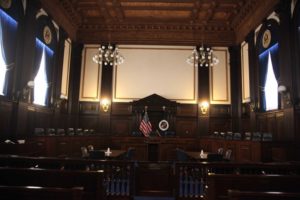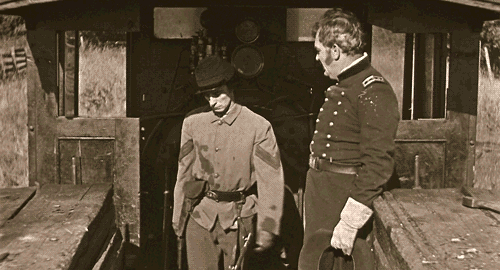 Celebrate Christmas in July and read about five business cases from the Fifth Circuit in 2017 that you should know.
Celebrate Christmas in July and read about five business cases from the Fifth Circuit in 2017 that you should know.
Monthly Archives: July 2017
 McCarty fell outside a restaurant kitchen; her subsequent lawsuit against the restaurant for premises liability failed for lack of evidence. The Fifth Circuit distinguished the Texas appellate authority she cited by observing: “The evidence in each of these cases provided context for how long the hazardous condition had existed, in the form of either a discrete and readily documented antecedent event (e.g., a rainfall) or an attribute of the hazard (e.g., a puddle’s size, from which the jury could reasonably infer how long the puddle had been growing). In this case, by contrast, no evidence would permit the jury to trace the alleged slip risk to a particular antecedent event. Nor could a jury infer from any attributes of the alleged hazard that it had been growing over any length of time.” McCarty v. Hillstone Restaurant Group, No. 16-11519 (July 18, 2017).
McCarty fell outside a restaurant kitchen; her subsequent lawsuit against the restaurant for premises liability failed for lack of evidence. The Fifth Circuit distinguished the Texas appellate authority she cited by observing: “The evidence in each of these cases provided context for how long the hazardous condition had existed, in the form of either a discrete and readily documented antecedent event (e.g., a rainfall) or an attribute of the hazard (e.g., a puddle’s size, from which the jury could reasonably infer how long the puddle had been growing). In this case, by contrast, no evidence would permit the jury to trace the alleged slip risk to a particular antecedent event. Nor could a jury infer from any attributes of the alleged hazard that it had been growing over any length of time.” McCarty v. Hillstone Restaurant Group, No. 16-11519 (July 18, 2017).
 The bankruptcy court ruled that a claim against the debtor, arising out of a scheme involving foreclosure proceedings, was nondischargeable. The Fifth Circuit affirmed, holding, inter alia, that the debt could be found nondischargeable because of the debtor’s participation in a civil conspiracy involving the scheme: “[Bankruptcy Code ] ection 523(a)(4) excepts from discharge debts ‘for . . . larceny.’ The text adds no further criteria or qualifications. Like § 523(a)(2), a plain reading of the provision is that a debtor cannot discharge a debt that arises from larceny so long as the debtor is liable to the creditor for the larceny. It is the character of the debt rather than the character of the debtor that determines whether the debt is nondischargeable under § 523(a)(4).” Cowin v. Countrywide Home Loans, No. 15-20600 (July 18, 2017).
The bankruptcy court ruled that a claim against the debtor, arising out of a scheme involving foreclosure proceedings, was nondischargeable. The Fifth Circuit affirmed, holding, inter alia, that the debt could be found nondischargeable because of the debtor’s participation in a civil conspiracy involving the scheme: “[Bankruptcy Code ] ection 523(a)(4) excepts from discharge debts ‘for . . . larceny.’ The text adds no further criteria or qualifications. Like § 523(a)(2), a plain reading of the provision is that a debtor cannot discharge a debt that arises from larceny so long as the debtor is liable to the creditor for the larceny. It is the character of the debt rather than the character of the debtor that determines whether the debt is nondischargeable under § 523(a)(4).” Cowin v. Countrywide Home Loans, No. 15-20600 (July 18, 2017).
 Duggan, an non-named member of a class certified under Fed. R. Civ. P. 23(b)(1), made an untimely objection to the fairness of the class settlement. While he was not a named party, he sought to appeal under the doctrine recognized by Devlin v. Scardelletti, 536 U.S. 1 (2002), which allowed non-named class members “who have objected in a timely manner to approval of the settlement at the fairness hearing have the power to bring an appeal without first intervening.” Unfortunately for Duggan, the Fifth Circuit found no reason to excuse his late objection, in particular rejecting the argument that his opponent was required to move to strike the objection in district court as a prerequisite to arguing waiver on appeal. Farber v. Crestwood Midstream Partners LP , No. 16-20742 (July 17, 2017).
Duggan, an non-named member of a class certified under Fed. R. Civ. P. 23(b)(1), made an untimely objection to the fairness of the class settlement. While he was not a named party, he sought to appeal under the doctrine recognized by Devlin v. Scardelletti, 536 U.S. 1 (2002), which allowed non-named class members “who have objected in a timely manner to approval of the settlement at the fairness hearing have the power to bring an appeal without first intervening.” Unfortunately for Duggan, the Fifth Circuit found no reason to excuse his late objection, in particular rejecting the argument that his opponent was required to move to strike the objection in district court as a prerequisite to arguing waiver on appeal. Farber v. Crestwood Midstream Partners LP , No. 16-20742 (July 17, 2017).
Duncan, a Wal-Mart employee, slipped on a mat near an ice freezer in the store. She sued for her injuries and the Fifth Circuit affirmed summary judgment for the defense, noting several ways in which her proof of a dangerous condition was lacking: “In Duncan’s deposition—the only evidence she and Johnson submitted in support of their claim—she repeatedly explained that she did not know how water developed under the mat on which she slipped. Duncan couldn’t say whether water had ‘somehow leaked or spilled underneath the mat’ or whether ‘something on top of the mat . . . leaked through it.’ No one at Wal-Mart told her that they knew there was water in that area before she fell, and she didn’t know whether water had ever accumulated in that area before. Duncan also said that in the four years she worked at Wal-Mart, she had never heard of the Reddy Ice machine leaking, even though she knew other appliances, like the ‘Coke machine,’ leaked. ” Duncan v. Wal-Mart Louisiana LLC, No. 16-31223 (July 14, 2017).
 I recently participated in a mock reargument of Marbury v. Madison (right), albeit changed from the original to (1) actually have discussion about judicial review (2) actually have participation by my character, Attorney General Levi Lincoln, who in “real life” was ordered to stay silent by a highly irritated President Jefferson. In case you should ever need such a thing, here are my notes about the case against judicial review, which rely heavily upon an outstanding 1969 Duke Law Journal article by Professor William Van Alstyne.
I recently participated in a mock reargument of Marbury v. Madison (right), albeit changed from the original to (1) actually have discussion about judicial review (2) actually have participation by my character, Attorney General Levi Lincoln, who in “real life” was ordered to stay silent by a highly irritated President Jefferson. In case you should ever need such a thing, here are my notes about the case against judicial review, which rely heavily upon an outstanding 1969 Duke Law Journal article by Professor William Van Alstyne.
 Litigation continues on the Texas tollroads, most recently producing a defamation lawsuit in BancPass v. Highway Toll Administration LLC, arising from letters sent by a company’s competitors to Google and Apple. The defendant unsuccessfully argued that the letters were immune from liability by the Texas privilege associated with court proceedings.
Litigation continues on the Texas tollroads, most recently producing a defamation lawsuit in BancPass v. Highway Toll Administration LLC, arising from letters sent by a company’s competitors to Google and Apple. The defendant unsuccessfully argued that the letters were immune from liability by the Texas privilege associated with court proceedings.
Before the Fifth Circuit, matters began well for the defendant – the Court concluded (1) that an immediate interlocutory appeal was allowed because the Texas privilege protects from suit, not just liability, and (2) while “[c]ertainly, the district court expressed its displeasure” at this issue arising late in the proceedings, it did not formally certify the appeal as frivolous (and thus avoided a line of cases that would otherwise have undermined defendant’s appeal right). But on the merits:
 “Texas caselaw is clear that our analysis must focus on the connection between the communications and the specific legal action HTA now claims that it was contemplating, rather than legal action more broadly. The letters to Google and Apple in particular put forward bare accusations of unlawful conduct that was unrelated to HTA’s later tortious interference claim and that neither directly implicated HTA’s own legal rights nor constituted legal claims that HTA had any ability to pursue.”
“Texas caselaw is clear that our analysis must focus on the connection between the communications and the specific legal action HTA now claims that it was contemplating, rather than legal action more broadly. The letters to Google and Apple in particular put forward bare accusations of unlawful conduct that was unrelated to HTA’s later tortious interference claim and that neither directly implicated HTA’s own legal rights nor constituted legal claims that HTA had any ability to pursue.”
No. 16-51073 (July 13, 2017).
 The Fifth Circuit recently granted rehearing en banc in two civil cases – Ariana M. v. Humana Health Services, 853 F.3d 753 (5th Cir. 2017), which reviewed the decisions of an ERISA plan administrator, and In re: Doiron, 849 F.3d 602 (5th Cir. 2017), which addressed whether a contract was “maritime” in nature. The common thread? Both opinions made express appeals to the full court for review:
The Fifth Circuit recently granted rehearing en banc in two civil cases – Ariana M. v. Humana Health Services, 853 F.3d 753 (5th Cir. 2017), which reviewed the decisions of an ERISA plan administrator, and In re: Doiron, 849 F.3d 602 (5th Cir. 2017), which addressed whether a contract was “maritime” in nature. The common thread? Both opinions made express appeals to the full court for review:
- In Ariana, all three panel members who joined in the same opinion also joined in a special concurrence: “As any sports fan dismayed that instant replay did not overturn a blown call learns, it is difficult to overcome a deferential standard of review. The deferential standard of review our court applies to ERISA decisions often determines the outcome of disputes that are far more important than a sporting event: decisions made by retirement and health plans during some of life’s most difficult times, as this case involving a teenager with a serious eating disorder demonstrates. So it is striking that we are the only circuit that would apply that deference to factual determinations made by an ERISA administrator when the plan does not vest them with that discretion.” (emphasis added)
- And the conclusion of the unanimous Dorian panel opinion said: “It is time to abandon the Davis & Sons test for determining whether or not a contract is a maritime contract. The test relies more on tort principles than contract principles to decide a contract case. It is too flexible to allow parties or their attorneys to predict whether a court will decide if a contract is maritime or non-maritime or for judges to decide the cases consistently. The Supreme Court’s decision in Kirby reinforces this conclusion. Just as important, the above test will allow all parties to the contract to more accurately allocate risks and determine their insurance needs more reliably.” (emphasis added)
 While not within the usual subject matter of this blog, the general importance to Texas business litigation of the Eastern District’s June 30 decision in Raytheon Co. v. Cray, Inc. warrants attention. Raytheon sued Cray in the Marshall Division of the Eastern District for alleged infringement of at least two patents about supercomputer systems. After the Supreme Court’s recent opinion in TC Heartland LLC v. Kraft Foods Grp. Brands LLC, 137 S. Ct. 1514 (2017), Cray moved to transfer, arguing that it (1) did not reside in the district and (2) had not committed acts of infringement or had a regular and established place of business there. The Eastern District adopted a four-factor test and denied the motion, examining —
While not within the usual subject matter of this blog, the general importance to Texas business litigation of the Eastern District’s June 30 decision in Raytheon Co. v. Cray, Inc. warrants attention. Raytheon sued Cray in the Marshall Division of the Eastern District for alleged infringement of at least two patents about supercomputer systems. After the Supreme Court’s recent opinion in TC Heartland LLC v. Kraft Foods Grp. Brands LLC, 137 S. Ct. 1514 (2017), Cray moved to transfer, arguing that it (1) did not reside in the district and (2) had not committed acts of infringement or had a regular and established place of business there. The Eastern District adopted a four-factor test and denied the motion, examining —
- physical presence “including but not limited to property, inventory, infrastructure, or people”;
- defendant’s representations “internatlly or externally, that is has a presence in the district”;
- benefits received from the defendant’s presence in the district, “including but not limited to sales revenue”; and
- “the extent to which a defendant interacts in a targeted way with existing or potential customers, consumers, users or entities within a district, including but not limited to through localized customer support, ongoing contractual relationships, or targeted marketing efforts.”
No. 2:15-CV-01554-JRG (June 29, 2017).
 By summary judgment, Advanced Recovery Systems lost a case brought under section 8 of the Fair Debt Collection Practices Act, alleging that it failed to disclose on credit reports that the plaintiff disputed two allegedly unpaid debts. Procedurally, while the summary judgment did not follow the traditional Rule 56 schedule, the Fifth Circuit found no harm because ARS had admitted to the district court that there were no remaining issues of fact. Substantively, the Court rejected a challenge to Article III standing, finding that the plaintiff’s injury was sufficiently “tangible” — “[T]he violation of a procedural right granted by statute can be sufficient in some circumstances to constitute injury in fact .. . . Among those circumstances are cases where a statutory violation creates the ‘risk of real harm’ . . . Unlike an incorrect zip code, the ‘bare procedural violation’ in [Spokeo, Inc. v. Robins, 136 S. Ct. 1540, 1549 (2016)], an inaccurate credit rating creates a substantial risk of harm.” Sayles v. Advanced Recovery Systems, Inc., No. 16-60640 (July 6, 2017).
By summary judgment, Advanced Recovery Systems lost a case brought under section 8 of the Fair Debt Collection Practices Act, alleging that it failed to disclose on credit reports that the plaintiff disputed two allegedly unpaid debts. Procedurally, while the summary judgment did not follow the traditional Rule 56 schedule, the Fifth Circuit found no harm because ARS had admitted to the district court that there were no remaining issues of fact. Substantively, the Court rejected a challenge to Article III standing, finding that the plaintiff’s injury was sufficiently “tangible” — “[T]he violation of a procedural right granted by statute can be sufficient in some circumstances to constitute injury in fact .. . . Among those circumstances are cases where a statutory violation creates the ‘risk of real harm’ . . . Unlike an incorrect zip code, the ‘bare procedural violation’ in [Spokeo, Inc. v. Robins, 136 S. Ct. 1540, 1549 (2016)], an inaccurate credit rating creates a substantial risk of harm.” Sayles v. Advanced Recovery Systems, Inc., No. 16-60640 (July 6, 2017).
 A recurring issue in contract litigation is whether a provision creates a “condition precedent” to the performance of other obligations. In Red Hook Communications I, LP v. On-Site Manager, Inc., the Fifth Circuit identified this provision as one that “plainly creates a condition precedent that both [parties] must comply with before either can bring suit (and thus, denying subject matter jurisdiction if it is not complied with): “[T]he Indemnifying Party and the Indemnified Party will, for a period of sixty (60) days following delivery of such objection, use good faith efforts to resolve the Dispute.” No. 16-11351 (July 3, 2017, unpublished).
A recurring issue in contract litigation is whether a provision creates a “condition precedent” to the performance of other obligations. In Red Hook Communications I, LP v. On-Site Manager, Inc., the Fifth Circuit identified this provision as one that “plainly creates a condition precedent that both [parties] must comply with before either can bring suit (and thus, denying subject matter jurisdiction if it is not complied with): “[T]he Indemnifying Party and the Indemnified Party will, for a period of sixty (60) days following delivery of such objection, use good faith efforts to resolve the Dispute.” No. 16-11351 (July 3, 2017, unpublished).